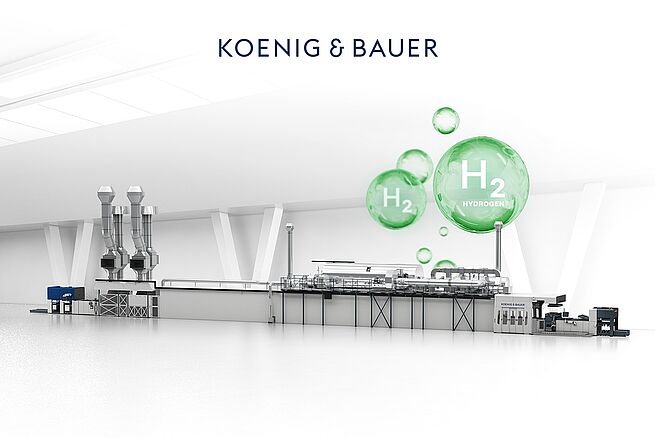Use of green hydrogen permits a significant reduction in carbon emissions from the overall production process
Successful testing of the first hydrogen-heated drying oven
Stable production in the accustomed quality
Conventional metal printing and/or coating lines incorporate thermal ovens heated with fossil fuels such as natural gas for drying of the typically used coatings. The latest HighEcon and EcoTNV systems from
Koenig & Bauer MetalPrint are designed for highly efficient operation and already enable gas consumption to be reduced by up to 70 percent compared to older installations without integrated exhaust air purification. If the gas is replaced with green hydrogen, however, further significant reduction in the carbon emissions of the overall production process is possible.
For Koenig & Bauer, sustainable production is a central element of its corporate strategy. Ralf Hipp, CEO of Koenig & Bauer MetalPrint, explains: “To minimise future carbon emissions and at the same time enable our customers to achieve essentially carbon-neutral production, we want both newly installed lines and existing Koenig & Bauer MetalPrint installations to be capable of operation with green hydrogen as their primary fuel in the future.”
It was with this aim in mind that Koenig & Bauer MetalPrint launched a feasibility study back in 2022. Independent institutes were involved in simulation of the hydrogen combustion process and assessment of the new safety concept. And cap and closure specialist Pano Verschluss GmbH also joined the project as a development partner. “We are really pleased to have such an innovative partner at our side, and Pano has agreed to equip its coating line for hydrogen-based operation as our pioneer user,” says Olga Martin, product manager at Koenig & Bauer MetalPrint.
For test operations, a hydrogen burner was retrofitted with the necessary safety provisions for H2 production and the first joint tests began at Pano in 2023: a team from Koenig & Bauer MetalPrint was on site at Pano to observe and support the test production with pure hydrogen. This also allowed various ideas for burner optimisation to be tested.
Everyone was agreed – production was stable, the VOC content in the exhaust air remained below the specified threshold and the final product displayed the accustomed quality. With the knowledge gained, it was possible to develop the first prototype system, which is now to be taken into service under real production conditions at Pano in 2025. For permanent installation, it is first necessary to prepare the hydrogen supply on the customer side.
The development project is viewed as a game-changer and will in future enable customers of Koenig & Bauer MetalPrint to achieve optimally sustainable production while at the same time contributing to the attainment of climate goals.
It is planned to offer the hydrogen burner both for new installations and as a retrofit for existing lines. To enable as many customers as possible to participate, installations for a hydrogen-natural gas mixture will also be possible as an intermediate step. This will help to smooth the transition as hydrogen is added to the gas supply, by compensating an initial shortage of pure hydrogen and cushioning possible price differences between the energy sources.
Where it will be several years before a hydrogen supply is established at a Koenig & Bauer MetalPrint customer’s premises, energy efficiency can be optimised by implementing further measures in the meantime. Examples here include recovery of the waste heat from thermal drying processes or use of the energy-saving UV-LED drying technology for certain production steps.
www.koenig-bauer.com









